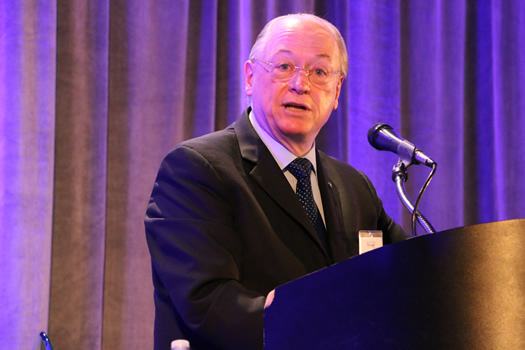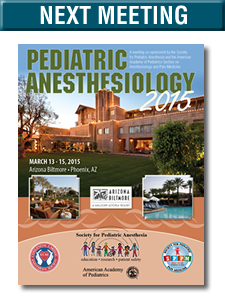SPA Annual Meeting Reviews
Session IV: Sleep Deprivation
By Elizabeth S. Yun, MD
University of Wisconsin School of Medicine
Dr. Yaster introduced David F. Dinges, PhD (University of Pennsylvania). He spoke about “Human Performance: Resiliency and Vulnerability to Sleep Loss.” Since it is impossible to capture the dynamic nature of the speaker and the lecture, this review will highlight the major points of the presentation. The earth’s daily rotation on its axis creates a genetic 24-hour clock in humans that is sensitive to sunrise and sunset. This circadian clock is located in the suprachiasmatic nucleus and controls the human sleep-wake cycle.

Dr. David Dinges
All animals and life forms need sleep. However, homo sapiens, as one of the newest life forms on earth, have created a lifestyle where activity occurs 24 hours a day. Several factors contribute to this lack of sleep - the morning early rising to go to work and the nighttime distractions, like TV, preventing early bedtimes. For humans, the circadian clock strongly influences our sleep duration. For example, pilots on long layovers maintain their sleep duration and timing consistent with their home circadian clock rather than the local time zone.
This non-linear relationship between sleep and the circadian cycle can lead to stable or unstable levels of performance and alertness. However, many work systems operate 24 hours, exposing people to fatigue, and do not take into account the nonlinear nature of sleep and the circadian cycle. Dr. Dinges noted that recovery from sleep requires sleep continuity, duration and intensity. He then reviewed multiple studies that demonstrate the negative effects of sleep deprivation, focusing on the operational consequences including unstable performance and alertness, cognitive slowing, neglect of nonessential tasks, involuntary microsleeps and increased risk for errors and accidents.
He then discussed the research examining phenotypic differences in the way sleep loss and circadian differences affect people. He noted three different individual responses to sleep-wake disruption longer than four days:
-
Type 1 people have full circadian rescue each day with no degradation in performance.
-
Type 2 reach a functionally asleep threshold at day two but still have a circadian rescue.
-
Type 3 people reach that same threshold at 16 hours and are very vulnerable to the effects of sleep deprivation.
Other studies have found genetic markers for the individual differences in neurobehavioral responses to sleep loss. Dr. Dinges reported studies demonstrating that chronic sleep deprivation followed by no sleep (as would happen during a night shift) led to sharp decrease in performance. He also described several tools for detecting performance impairing sleep loss. He noted that computer recognition of slow blinks with the levator palpebrae muscle predicted lapses in performance early and precisely. Dr. Dinges then discussed the importance of fatigue management. He described integrating four different approaches:
-
Predicting the sleep loss and one’s response to it
-
Prevention of sleep loss by altering schedules
-
Detection of fatigue signs, and
-
Intervention
However, this challenge remains, as exemplified by ACGME attempts to regulate work hours. Government and policies can only control work hours and not sleep hours.



